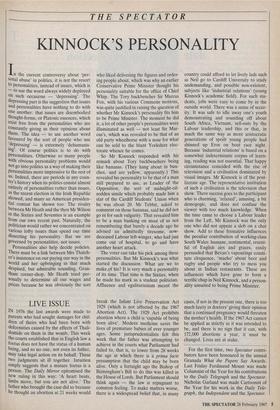THE SPECTATOR
KINNOCK'S PERSONALITY
In the current controversy about `per- sonal abuse' in politics, it is not the resort to personalities, instead of issues, which is — to use the word always widely deployed on such occasions — 'depressing'. The depressing part is the suggestion that issues and personalities have nothing to do with one another: that issues are disembodied thought-forms, or Platonic essences, which exist free from the personalities who are Constantly giving us their opinions about them. The idea — to use another word favoured by the sort of people who use 'depressing' — is extremely 'dehumanis- ing'. Of course politics is to do with Personalities. Otherwise so many people with obvious personality problems would not go into politics as a way of making their personalities more impressive to the rest of us. Indeed, there are periods in any coun- try's history when its politics consist almost entirely of personalities rather than issues, as the recent election in the Irish Republic showed, and many an American presiden- tial contest has shown too. The rivalry between Mr Heath and the then Mr Wilson in the Sixties and Seventies is an example from our own recent past. Naturally, the politician would rather we concentrated on various lofty issues than spend our time dissecting his personality. But we are governed by personalities, not issues.
Personalities also help decide policies. There must be a link between Mrs Thatch- er's insistence on our paying our way in the world and her upbringing in that much despised, but admirable sounding, Gran- tham corner-shop. Mr Heath tried per- sonally to determine all our wages and Prices because he was obviously the sort who liked delivering the figures and order- ing people about, which was why an earlier Conservative Prime Minister thought his personality suitable for the office of Chief Whip. The Tory backbencher Sir Marcus Fox, with his various Commons motions, was quite justified in raising the question of whether Mr Kinnock's personality fits him to be Prime Minister. The moment he did it, a lot of other people's personalities were illuminated as well — not least Sir Mar- cus's, which was revealed to be that of an old party wheelhorse with a nose for what can be sold to the blunt Yorkshire elec- torate whence he comes.
So Mr Kinnock responded with his remark about Tory backbenchers being like bananas. (They hang about in bun- ches, and are yellow, apparently.) This revealed his personality to be that of a man still prepared to use, as Leader of the Opposition, the sort of midnight-oil- sodden simile which probably made him a star of the Cardiff Students' Union when he was about 20. Mr Tebbit, asked to comment on those bananas, said he did not go in for such vulgarity. That revealed him to be a man banking on most of us not remembering that barely a decade ago he advised an admittedly tiresome, now- deceased Labour left-winger, who had just come out of hospital, to go and have another heart attack.
The voter can take his pick among these personalities. But Mr Kinnock's was what started the discussion. What are we to makesof his? It is very much a personality of its time. That time is the Sixties, when he made his mark as a student politician. Affluence and egalitarianism meant the country could afford to let lively lads such as Neil go to Cardiff University to study undemanding, and possible non-existent, subjects like 'industrial relations' (young Kinnock's academic field). For such stu- dents, jobs were easy to come by in the outside world. There was a sense of secur- ity. It was safe to idle away one's youth demonstrating and sounding off about South Africa, Vietnam, sell-outs by the Labour leadership, and this or that, in much the same way as more aristocratic generations of spoilt young people had shinned up Eros on boat race night. Because 'industrial relations' is based on a somewhat indeterminate corpus of learn- ing, reading was not essential. That happy circumstance coincided with the rise of television and a civilisation dominated by visual images. Mr Kinnock is of the post- literate age. The representative institution of such a civilisation is the television chat show. There success goes to the participant who is charming, 'relaxed', amusing, a bit demogogic, and does not confuse the viewer with too much knowledge. When the time came to choose a Labour leader from the Left, Mr Kinnock was the only one who did not appear a slob on a chat show. Add to these formative influences the peculiar contribution of working-class South Wales: humane, sentimental, resent- ful of English airs and graces, easily persuaded that Bevan's vapourings consti- tute eloquence, 'macho' about beer and rugby and people who try to mess you about in Indian restaurants. These are influences which have gone to form a terrific chap in Neil Kinnock, and a person- ality unsuited to being Prime Minister.


















































 Previous page
Previous page